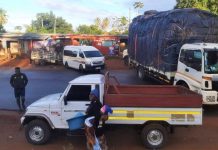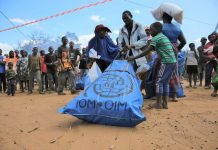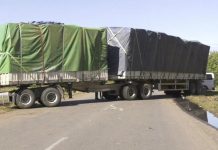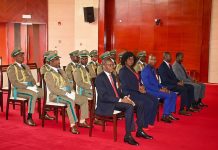Africa-Press – Mozambique. At Miconi school, in the Mozambican province of Cabo Delgado, children’s games can be heard, but no one is going to class. Among the hundreds displaced after new terrorist attacks, Pedro searches for the family of the boy he held by the hand.
“Someone was beheaded while we were fleeing (…). I fled with my wife and two children, and a child who isn’t part of my family, but was following me, is still with me. I was lost,” says Pedro Soares, 27, as he tries to regroup in the playground at Miconi Elementary School, in the town of Chiúre.
Thousands began arriving there over the weekend, with at least two schools in the district’s main town taken over by people displaced from areas further south, attacked in recent days by insurgent groups linked to the Islamic State.
Most are repeating the journey, on foot – lasting more than a day – made in March 2024, when a violent wave of terrorist attacks led to the exodus of entire villages.
For Pedro, a community health and HIV activist, this is the third time he has fled the village of Maririni, Chiúre Velho, 50 km away. This time, he ended up bringing someone’s eight-year-old child with him.
“We’ve already found the family,” he explains, adding that in the last few hours he managed to reach the parents, hidden in a forest near Pedro’s home: “The child stays with you, hold on tight,” was the message he heard on the other end of the cell phone, in a barely audible connection.
The escape, along with the children, took place during the night, with a few hours of sleep in a neighbouring village, always with reports that the terrorists “were approaching”.
For now, it’s time to wait for some security before considering next steps, although I can’t find any explanation for a new attack on the village: “For now, I don’t know yet.”
Elements associated with the extremist group Islamic State claimed responsibility for an attack on the police station of the Chiúre Velho in southern Cabo Delgado province on Thursday, using automatic weapons, and looting material from inside.
The claim, made through Islamic State (IS) propaganda channels, is documented by a video in which the rebels, allegedly belonging to the Ahlu-Sunnah wal Jama’a (ASWJ) group, fire bursts of machine gun fire and enter the police station, claiming to have stolen material, after burning a vehicle and “freeing Muslim prisoners”. There were no known casualties or injuries from this attack.
Adelina Adolfo, 20, was there shortly before. She had left everything behind in the village of Namitil, in southern Cabo Delgado, since Thursday, and after many hours of walking through the forest with her seven-month-old daughter in her arms, Adelina arrived at the same school playground.
“I’m suffering a lot, I have no clothes. I left my clothes at home, I have no food,” she tells Lusa, as dozens of children play in the closed school playground, a scene of apparent normality, except that the space had been taken over by bonfires and pots, with women trying to cook some rice as night fell.
She brought “a few things” for the journey and managed to join “many people” along the way, escaping fear, late into the night: “We heard there was a war going on.”
Displaced people from southern Chiúre continue to arrive at the school, where, in a nearby field, children play soccer and older people try to find food. Women gather around pots and pans, cooking with what little they have, while tents make shift to accommodate a growing number of displaced people, postponing classes for the village’s students.
Afonso Camisa, a 43-year-old farmer and trader, began his escape on foot on Thursday from the village of Ntonhane with his wife and eight children after seeing his 41-year-old nephew beheaded by insurgents.
“Terrorists came in there, until they beheaded my nephew. They burned five houses. They didn’t burn my house, but they broke down the door and took seven bags of beans and five bags of corn,” he reports, a material loss that represents many months of work in the machamba (agricultural field).
Today, he says, “the village is empty”, but he can’t understand the reason for the attacks: “Do I understand? Why did they do it? I don’t know. It’s war, I don’t know. They’re terrorists.”
“I don’t know how to explain it, I’m just watching,” adds Afonso, admitting that in March 2024 he experienced the same nightmare: fleeing, leaving everything behind, with 85 houses burned down in the village, the same one where he grows peanuts, corn, sesame, and beans on his farm, to eat and sell.
Still, he is certain of one thing: “When things calm down, I’ll go back home because I can’t live here.”
These concerns are shared by 45-year-old farmer Estêvão Bernardo, now living in the same school building at the entrance to Chiúre.
He fled Ntonhane alone on Sunday. His wife remained in the forest with their five children and a grandson, aged five to 17.
This is the second time in just over a year that Estêvão has left everything behind due to terrorist attacks. They walked over 35 km through the forest alone until they reached Chíure.
“They went in there, beheaded a man right on the road, and burned six houses, so I couldn’t find and take my wife and children. I tried to escape through the forest, and I emerged on the road, on the other side,” says Estêvão, later confirming that he was able to speak to his wife: “They’re all fine.”
“I can’t. I’ve been here since morning,” he says, referring to the makeshift centre at the school.
“My house wasn’t hit, but it was robbed, they took my belongings,” he says, also saying that he will return to the village as soon as he can.
“Since I can’t afford to live here, when things calm down, I’ll go back there. I can’t afford to live in the city,” he says.
Gas-rich northern province of Cabo Delgado has been facing an armed rebellion since 2017, which has left thousands dead and a humanitarian crisis, displacing more than a million people.
At least 349 people died in attacks by Islamic extremist groups in northern Mozambique in 2024, a 36% increase over the previous year, according to a study released in February by the Africa Center for Strategic Studies (ACSS).
According to the ACSS, which studies security issues in Africa, this “recovery in violence levels” in Mozambique “reflects the strategy” of the ASWJ group – an IS affiliate operating in Cabo Delgado province – of “expanding the conflict by moving inland and into more rural areas”.
For More News And Analysis About Mozambique Follow Africa-Press






